 MyDogBreeds
MyDogBreeds Papillon is originated from France but McNab is originated from United States. Papillon may grow 36 cm / 14 inches shorter than McNab. Papillon may weigh 25 kg / 55 pounds lesser than McNab. Both Papillon and McNab has same life span. Papillon may have less litter size than McNab. Papillon requires Moderate maintenance. But McNab requires Low maintenance
Papillon is originated from France but McNab is originated from United States. Papillon may grow 36 cm / 14 inches shorter than McNab. Papillon may weigh 25 kg / 55 pounds lesser than McNab. Both Papillon and McNab has same life span. Papillon may have less litter size than McNab. Papillon requires Moderate maintenance. But McNab requires Low maintenance
 With his eye-catching butterfly-look-alike feathery ears, the Papillon, also called the Continental Toy Spaniel or the Squirrel Spaniel, is one of the oldest of the toy spaniels.
With his eye-catching butterfly-look-alike feathery ears, the Papillon, also called the Continental Toy Spaniel or the Squirrel Spaniel, is one of the oldest of the toy spaniels.
You can see that the history of the Papillon goes very far back as the dog has been depicted in early works of art dating back to the 1500s. They were at first bred for the companions of noblewomen, appearing in many paintings where they are seen in royal courts.
The AKC registered its first Papillon in 1915. It is believed that the dog hails from France and Belguim. The Papillon was first recognized by the AKC in 1935 and the Papillon Club of America was also formed.
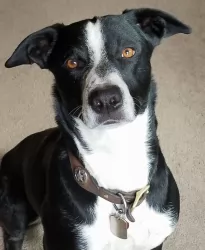 The attractive McNab dog is also known as the McNab Shepherd or McNab Collie. This very lively dog originated in the Mendocino region of Northern California, being specifically bred to withstand tough weather conditions and rough terrain.
The attractive McNab dog is also known as the McNab Shepherd or McNab Collie. This very lively dog originated in the Mendocino region of Northern California, being specifically bred to withstand tough weather conditions and rough terrain.
The dog is becoming popular outside of California now. A Scottish rancher with the surname McNab left Scotland and arrived in California in the 19th century. He crossed Scottish Border Collies with Shepherd dogs and the ranchers in California started using these dogs for herding livestock.
Today they are still being used as herding dogs in California and other countries. The dog isn’t recognized by the American Kennel Club. It was in 2014 that a group of McNab Shepherd breeders established the McNab Shepherd Registry so as to work towards the advancement of the McNab Shepherd.
 Papillon means 'butterfly' which refers to the dog's fringed upright ears. You also get the floppy eared variety which is known as phalene, meaning 'moth'.
Papillon means 'butterfly' which refers to the dog's fringed upright ears. You also get the floppy eared variety which is known as phalene, meaning 'moth'.
The Papillon dog stands at between 20 – 28cm in height and weighs between 3 and 4.5kg. The tail arches over the back in a feathery plume. His coat is thick and silky but he doesn't have an undercoat. The coat is white with tan or white with black.
When you look at his bright little face, you can see that he is an intelligent dog who can be trained and socialized with ease. In fact he loves to be occupied with something challenging, so it will be a good ides to buy him some stimulating toys to play with.
When you first see the Papillon dog you might think he is fragile like a butterfly – a typical lap dog – but this isn't so at all. He is tough, robust, energetic, alert and friendly. Bright and alert, they also make great watchdogs.
He'll be able to adapt to life in the city or the countryside. Even though he is good with children and pets in the home, he'd prefer to live with adults as he couldn't handle undisciplined rough and tumble children who haven't learned how to respect dogs, especially little ones that can get hurt easily.
This is such a sweet-natured little dog that you want to do everything you can to keep him content
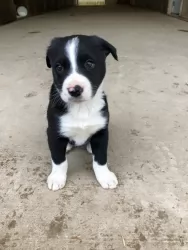 The McNab Dog is a medium-sized working dog. The appearance of this dog varies quite a bit. For instance you may come across a dog with erect ears or floppy ears or a long tail or one that is naturally bobbed.
The McNab Dog is a medium-sized working dog. The appearance of this dog varies quite a bit. For instance you may come across a dog with erect ears or floppy ears or a long tail or one that is naturally bobbed.
When it comes to size, you will find that between the males and females they stand at roughly 40 – 64cm and weigh anything from 14 – 30kg.
Most of these McNabs are black or red with white feet, white tipped tails and white markings around the face. The coat is weather resistant and fairly short and dense. You also get tri-colored McNabs. Eyes are usually a brown or copper color though you might find some with bluish eyes as well.
These are such intelligent dogs so with training and socialization you’ll find he is able to learn easily and quickly. He is a self assured dog, so he will respond well to an owner who is firm and fair, patient, kind and consistent.
He is best suited to life in the country as he needs lots of place to run around. If you don’t live on a farm, take the dog for long walks every day as he requires lots of exercise and mental stimulation. He is a loving family member too, getting along well with kids in the home as well as other pets. He is also a good guard- and watch dog, taking his job as protector of his human family very seriously.
 The Papillon is a bright, intelligent and energetic little dog. When you bring him into your home you must remember that small though he is, he will require lots of mental and physical exercise.
The Papillon is a bright, intelligent and energetic little dog. When you bring him into your home you must remember that small though he is, he will require lots of mental and physical exercise.
You're going to love having the Papillon in your home as he is guaranteed to make the sweetest, most loving pet and companion.
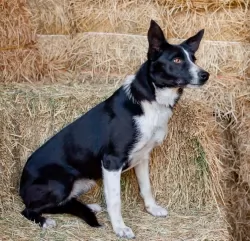 The McNab makes a splendid pet and is known to be even-tempered, being friendly and tolerant with his entire human family.
The McNab makes a splendid pet and is known to be even-tempered, being friendly and tolerant with his entire human family.
He gets on well with children in the home as well as other pets. He has always been a hard working pet and doubles up as being an excellent guard dog too. Those who have had the McNab as a pet say that you couldn’t get a more excellent family canine friend.
 As a responsible dog owner you want to make sure that your pet has the best chance to reach the age of 14, 15 or 16. Unfortunately, there are always some common dog illnesses that you need to be aware of -
As a responsible dog owner you want to make sure that your pet has the best chance to reach the age of 14, 15 or 16. Unfortunately, there are always some common dog illnesses that you need to be aware of -
This condition occurs when the dog's patella or kneecap is dislocated and then it can only be returned to its normal position once the quadriceps in the hind legs of the dog relax and lengthen. You’ll see dogs with this condition holding up a hind leg. This joint abnormality is more common in toy breeds like this.
The windpipe of a dog is made out of tissue membranes and when the dog breathes, air quickly moves through the trachea, causing the pressure inside of it to go down. A weak cartilage in the windpipe causes a collapsed trachea in dogs, and occurs almost exclusively in small dogs such as the Papillon.
Many small dogs are born with cartilage that is strong enough to hold the trachea open. As cartilage ages though, it weakens. You’ll notice your dog has a rasping cough when he is excited. Sometimes it is mistaken for kennel cough which can be remedied fairly quickly while a collapsed trachea in dogs is a lifelong syndrome.
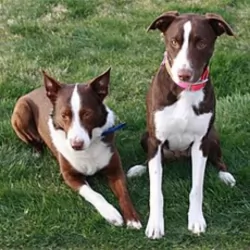 This dog doesn’t really have genetic health issues, but they can suffer with hip dysplasia, a problem that many dogs battle with, whether small or large, young or old.
This dog doesn’t really have genetic health issues, but they can suffer with hip dysplasia, a problem that many dogs battle with, whether small or large, young or old.
They can also suffer with epilepsy and an eye disease such as entropion where the lid of the eye is turned inwards. Check its ears and teeth regularly for infections and keep up to date with his vaccinations.
The McNab is a health dog breed so you aren't likely to face any of these common dog health issues.
 Papillons are average shedders so they will require brushing at least twice a week. Certainly the long ear fringes will need to be washed and brushed, after all this is this little dog’s trademark.
Papillons are average shedders so they will require brushing at least twice a week. Certainly the long ear fringes will need to be washed and brushed, after all this is this little dog’s trademark.
You’ve got to be careful with a small dog like the Papillon as it can easily become overweight and that in itself can bring on health problems. There are excellent commercially manufactured dog foods for small breed dogs that have the right amount of minerals and vitamins in them. Choose the best quality ones.
Home-made food such as chopped-up boiled chicken, some brown rice or pasta and cooked vegetables such as carrots, spinach and sweet potatoes can keep your little dog healthy and fit. Dogs just want simple, nutritious meals which aren’t changed often as it could upset their digestive system.
Keep things consistent and avoid human foods such as chips, chocolates, coffee and spices Never leave your pet without a steady supply of fresh, cool water.
Provide your pet with a nice warm, dry bed.
If you bring a puppy into the home, check on puppy vaccines to avoid some deadly diseases.
Get your dog neutered or spayed if you don’t want it to become a parent.
Exercise your pet and provide him with love and attention.
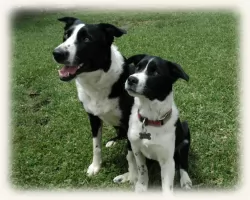 You can feed your McNab dog commercial dry kibble, but then you want to be sure its the best quality one. Buying inferior foods means that you’re getting a whole lot of ingredients in the food that are bad – sugar, salt, preservatives, fillers, colorants etc. Rather go for the best brands that will ensure that your dog is getting all the vitamins and minerals he needs.
You can feed your McNab dog commercial dry kibble, but then you want to be sure its the best quality one. Buying inferior foods means that you’re getting a whole lot of ingredients in the food that are bad – sugar, salt, preservatives, fillers, colorants etc. Rather go for the best brands that will ensure that your dog is getting all the vitamins and minerals he needs.
Homemade food is also important and foods such as boiled chicken, brown rice and pasta as well as cooked or raw vegetables chopped up and added to his dry kibble can make for a delicious, wholesome treat. It will be to his benefit if you can every now and then give him some raw meat as well. Make sure to see that he has a constant supply of fresh, cool water.
McNab Shepherds are very active dogs and they are going to require quite a bit of physical exercise as well as mental stimulation. They are dogs who have been used to herding livestock and he loves this busy life. It is why he wouldn’t be happy living in the city but is better suited to farm life or in a home with a large garden. Long walks and hikes will suit him as well as swimming and joining in every game there is.
The McNab is considered to be a low maintenance dog and grooming the short thick coat will be required twice a week. Always check around the eyes and ears as well as inside the mouth for problems and infections.